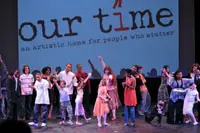On a clear summer night, 10 kids gather on stage in a small theater in Greenwich Village. To warm up, they jump up and down, scream, yell, sing and laugh. The audience filters in, the lights dim, and three short stories begin to unravel. One is about having the strength to be yourself and pursuing your dreams, another about acceptance. Pretty normal themes for kids and teenagers. Except something is different about this performance, because something is different about these kids–they stutter.

Our Time Theatre was started six years ago by Taro Alexander, who began stuttering when he was 5 years old. It’s now an organized, successful program allowing performing art as a healing mechanism for children and teens who stutter.
Growing up surrounded by theatre, Alexander started acting at a young age, and despite his verbal difficulties, excelled (he was even in the cast of Stomp for four years). “I grew up feeling really alone. I would do anything to avoid stuttering, which usually meant not saying what I wanted. It just became too much for me, so I had the idea to start Our Time,” he says.Now, there are now 18 actors, three full-time staff, and volunteers. It’s a place where stuttering is embraced, and everyone takes as much time as needed. But Alexander wants it to be clear: “Performing is about giving them confidence when they stutter. Once they have that confidence, it helps them do whatever else they want to do in life.”
Keith Russell, a 16-year-old from Bed-Stuy, Brooklyn, has been a part of Our Time for about five years. For him, it’s not even the acting that appealed, but the environment. He’s been stuttering ever since he can remember. “It’s a struggle for me to even do easy things, like ordering food. A lot of the time I won’t even order; I’ll just go to the store and I’ll order what’s easiest to say.” As one might expect, Keith has received his fair share of cruelty from other kids his age, but instead of constantly trying to fit in and improve his fluency, Our Time, he says, has finally helped him accept his speech. “I don’t really want to speak better. I think I speak perfectly well. Stuttering is a part of me,” he explains.According to Our Time’s website, worldwide over 60 million people stutter. Dr. Phil Schneider, a speech pathologist, explains that stuttering is different from other speech impediments – there is no cure, no one is quite sure what it’s caused by, and it has to do with connections in the brain. Five percent of children tend to stutter, compared to one percent of adults — so stuttering sometimes improves with age.
For decades, stuttering was thought to be an anxiety disorder because it can often cause stress. In turn, it can be made worse by stress, as well as fatigue and excitement. But stuttering isn’t a speech problem — it’s a speech communication problem. When talking to themselves alone in a room, many people don’t stutter. When a person comes in, they’re communicating their thoughts to someone else, and that’s when stuttering occurs. A lot of people don’t stutter on stage or when they’re singing, perhaps because it’s prepared, rehearsed and more focused. But again, Alexander stresses that this is not why he promotes the stage. The stage is for the kids to stutter more freely, without fear or inhibition. Alexander feels that, no matter how extreme the stuttering, confidence is the first step to conquering it. As he explains it, stuttering stays with you throughout the day, day in and day out. When people first meet him, he says, they sometimes get an odd expression on their face, as if they’re not sure what’s happening. If he stutters on his name, they might say, “What’s wrong? Did you forget your name? That stuff hurts really deeply.” Alexander says, “particularly when you’re a kid. It can make you not want to talk to people and not open yourself up. It can be an all-consuming thing. Especially when you’re not completely comfortable with yourself.”
If your child stutters:
1. Be a good listener. Don’t interrupt them or finish their sentences. Just let them take their time and stay focused on the message.
2. Although the most important thing is confidence, some strategies that might help reduce stuttering are speaking in a softer voice, finding ways to speak more slowly and pausing more often.
3. Contact the National Stuttering Association (www.nsastutter.org) and The Stuttering Foundation (www.stutteringhelp.org) to get support and more information.





















